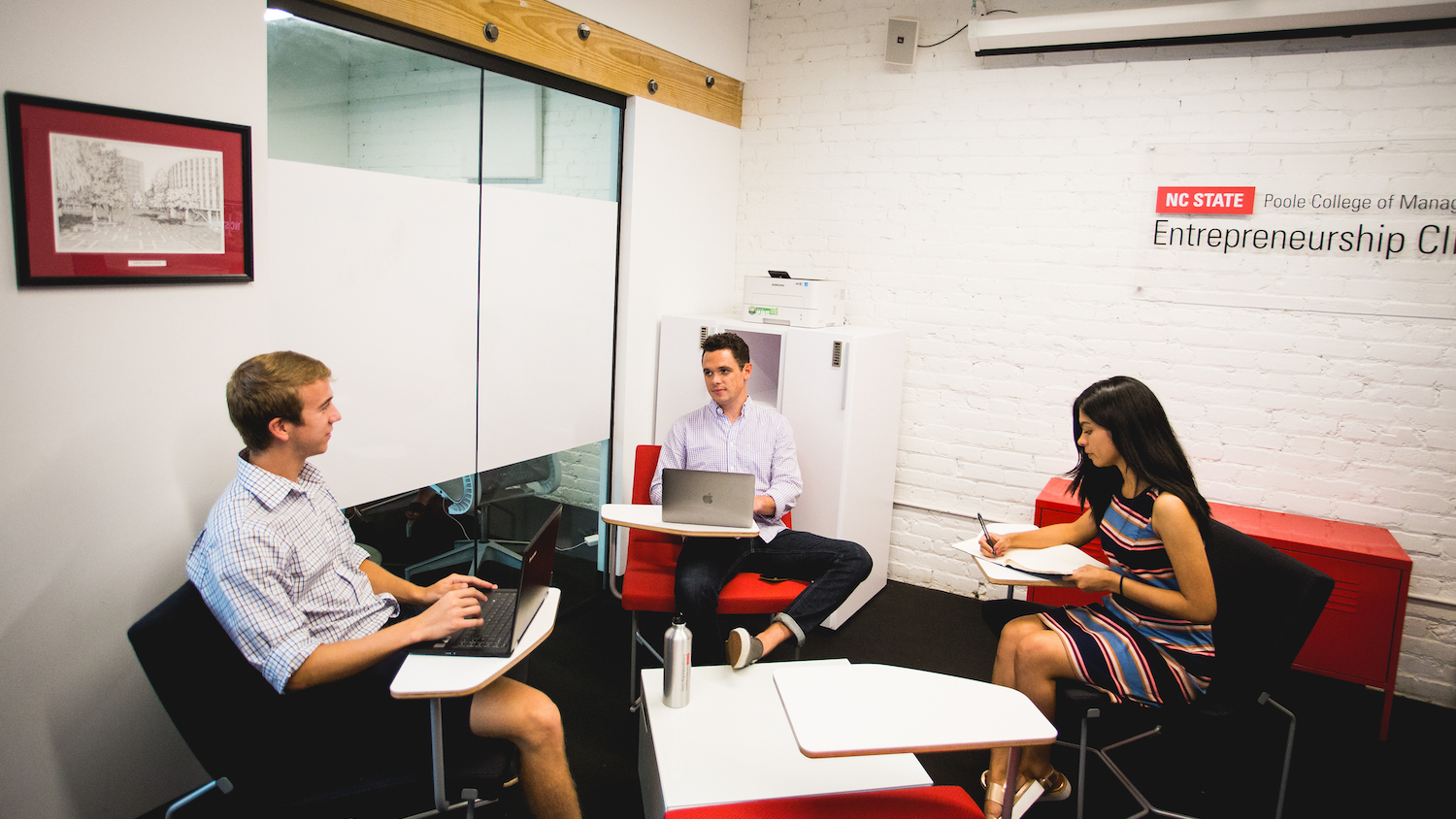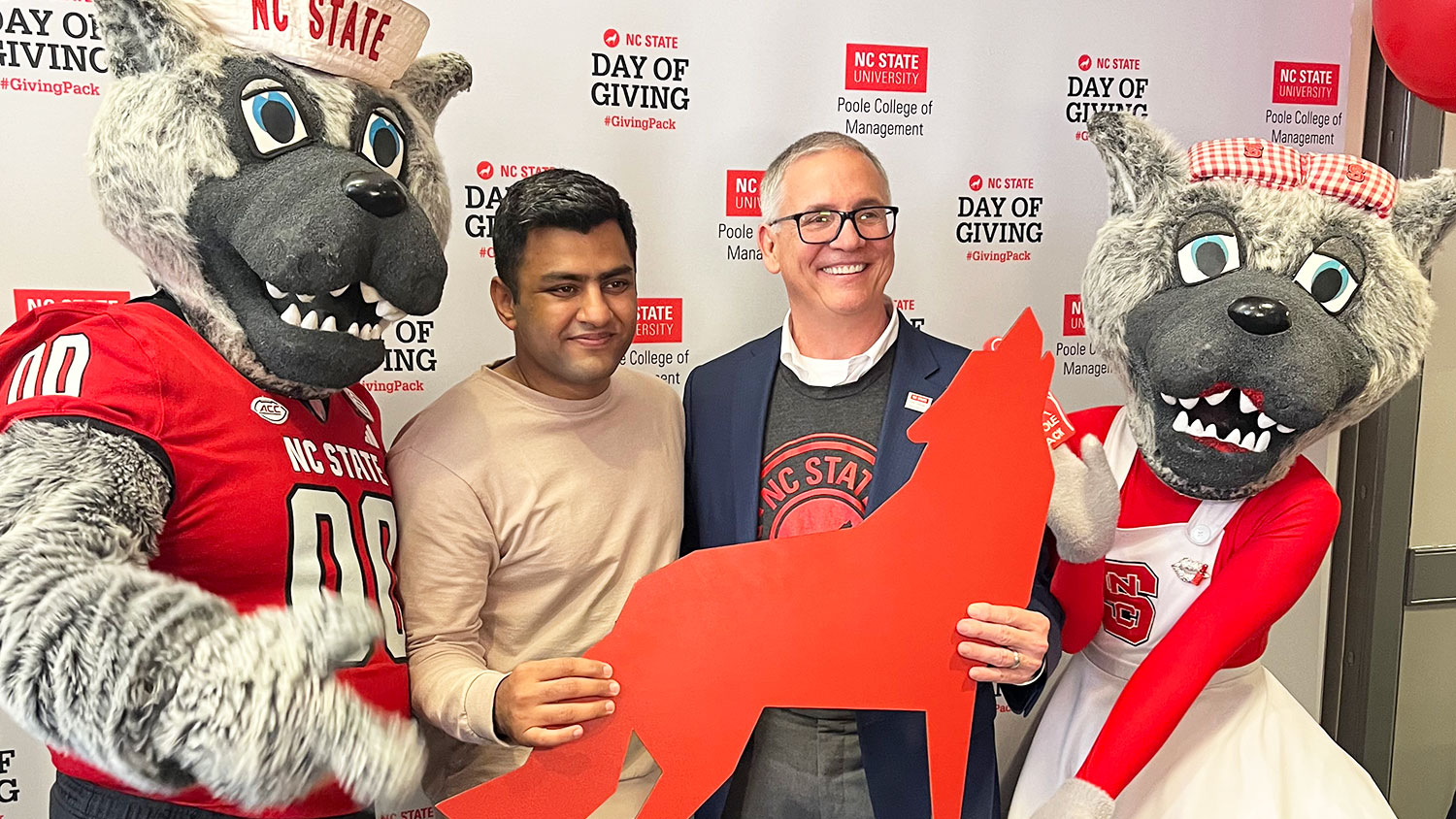The Gift of a Lifetime
Poole College of Management reflects on 10 years since the Poole Family Endowment.

By Caroline Barnhill
On a cold morning in December 2010, Nelson Auditorium was filled with students, faculty, staff, community members, college supporters and local reporters as an historic gift was announced. Lonnie C. Poole, Jr., founder of Waste Industries, and his wife, Carol Johnson Poole, shared their intent to donate $40 million to the university –– $37 million of which was designated to fund an endowment to support the College of Management, now named the Lonnie C. Poole Jr. College of Management.
The endowment was the largest gift given to NC State in school history, and, in an interview with the Triangle Business Journal, Chancellor Randy Woodson shared it would “elevate our ability to have one of the most competitive business colleges in the country.”
They were prophetic words.
“Over the past 10 years, Poole College has experienced tremendous growth, not only in rankings – including as one of the top schools for entrepreneurship across the country –– but also in our ability to attract and retain exceptionally talented faculty members and students,” says Frank Buckless, dean of the Poole College of Management. “The generosity and vision of Lonnie and Carol Poole provided our college with the resources to deepen our impact through transformative research and practical student experiences.”
2011: Jenkins MBA Program established
2015: The Entrepreneurship Clinic is established
2015: Business Sustainability Collaborative is established
2015: McLauchlan Leadership Series for Jenkins MBA students is established
2016: Honors Analytics Program for undergraduate students is created
2019: Jenkins Online Master of Accounting program is established
2019: Poole Leadership Program for all undergraduate students is established
2019: The Office of Global Programs is expanded to college-wide
2020: Business Analytics Initiative is established
2020: The Office of Diversity and Inclusion is elevated to the college-level
2021: Master of Management in Marketing Analytics will be launched
“These significant undertakings, which have impacted the lives of thousands of students, faculty and business professionals, would simply not have been possible without the Poole endowment,” Buckless says. “Beyond new programs and initiatives, we have been able to support faculty research and launch our Poole Thought Leadership website that puts faculty knowledge and research into actionable insights for our broader community.”
While the endowment has touched a multitude of areas across the college, two key disciplines – entrepreneurship and sustainability –– were personally chosen by the Pooles as critical for the college’s future success.
Blazing Trails in Entrepreneurship
There are few disciplines across the college that show the impact of the Poole gift as much as its entrepreneurship program. The growth of the program has drastically increased over the last decade to not only impact Poole students, but also students from every one of NC State’s 12 colleges. Lewis Sheats, assistant vice provost for entrepreneurship, says the launch of the college’s Entrepreneurship Clinic in 2015 has made widespread impact not only on our students, but also companies across the country who choose to partner with the Poole College in hopes of accessing the next great entrepreneurial minds.
“The E-Clinic, which is housed in start-up hotspot Raleigh Founded (formerly known as HQ Raleigh) has allowed us to really embed ourselves within the entrepreneurial ecosystem,” explains Sheats, who also serves as the clinic’s executive director. “We now have greater engagements with business partners, which has led to increased recruitment of our students, and even a cyclical effect where we see our alumni come back with new projects for our current E-Clinic students to work on.”
In measuring the program’s success, Lewis also points to the growth of students interested in entrepreneurship across the university. Currently, 16 percent of undergraduate students across campus take at least one class in entrepreneurship.
“When I started applying the clinical model of entrepreneurship to teaching in 2008, you might find two or three students who were not in the business school in my classes,” he says. “Today, about half the students involved in our entrepreneurship program are from other areas across the university –– from engineering to agriculture to textiles. Our teams are now stronger because the students bring with them different skillsets and backgrounds. They think differently from one another and learn to collaborate as a team, which is exactly what they’ll be doing in the real world.”
Sheats credits the Poole family for serving as a “northstar,” guiding the college to create a more structured and collaborative approach to entrepreneurship –– and it’s paying off.
Today, the university’s undergraduate and graduate entrepreneurship programs are ranked in the top 20 of schools nationwide, according to recent Princeton Review rankings. While pleased with the rankings, Sheats is quick to point out that the program’s work is not done in pursuit of rankings, but rather in equipping the next generation of entrepreneurs.
“We see rankings as just one way to validate the hard work we are doing within the college. However, we recognize that these rankings bring increased awareness of our program not only to prospective students, but also to top companies looking to partner with us,” Sheats says.
And while the program continues to grow year after year, Sheats isn’t done yet.
Ten years ago, maybe 50 students within the college participated in an entrepreneurship class each semester –– today it’s more than 1,000 each year. Over the next five years, I want to expand that even more so that each student at Poole College participates in an entrepreneurship class or program.
“I’m an entrepreneur at heart so of course I always want to keep moving. Ten years ago, maybe 50 students within the college participated in an entrepreneurship class each semester –– today it’s more than 1,000 each year. Over the next five years, I want to expand that even more so that each student at Poole College participates in an entrepreneurship class or program,” Sheats says. “We’re also working to create more company spin-offs through our E-Clinic, while graduating an entrepreneurial-minded workforce equipped to lead these spin-offs alongside partner companies. We’re going to keep doing what we’re doing, while also figuring out how to push the bar even further.”
Shining a Spotlight on Business Sustainability
When Jessica Yinka Thomas came on board at Poole College in 2013, she brought with her years of experience working domestically and internationally in sustainable enterprise, social innovation and business development, as well as expertise leading sustainability focused academic initiatives at UNC’s Kenan Flagler Business School and Duke’s Pratt School of Engineering.
“When I joined Poole, there was already an incredible amount of work being done in the area of sustainability within the college, but what the Poole’s gift allowed us to do was bring together that existing research, teaching and engagement work under a more formal initiative –– the Business Sustainability Collaborative (BSC) and build from there,” Thomas explains.
The investment, she says, was a timely one.
“From everything we’re seeing in the business world, the purpose of business has shifted from merely one of product or service creation and profitability, to instead one that creates value for its customers, shareholders and employees and benefits the communities in which companies operate, while also minimizing its impact on the environment,” Thomas says. “More and more businesses are seeking to adopt sustainable business practices, but are unsure of how to go about it.”
In response, Poole College is on the frontlines creating the next generation of professionals capable of using business as a force for good.
Since the inception of the BSC, Thomas and others have worked to engage faculty across disciplines to strategically embed sustainability into their curriculum within Poole’s undergraduate, MBA and MAC programs. Today, twenty-seven percent of Poole faculty are teaching sustainability within their courses –– touching issues such as labor and human rights within the supply chain, impact investing in finance, conscious consumer behavior in marketing and other strategies to incorporate sustainable business practices.
“As part of the clinic, we’ve engaged 329 students and worked on 68 projects with companies around the world –– from tech startups to multi-national corporations –– allowing these companies to connect with our students to improve their social and environmental impact,” Thomas says. “Due to the program’s success, other academic institutions like the University of Florida, the University of Georgia and the University of New Hampshire, are replicating the model we created. Poole College is truly an innovator in this space of creating experiential learning opportunities for students, and allowing them to apply what they’re learning in the classroom within a real-world setting that makes an actual impact on real businesses.”
Due to the program’s success, other academic institutions like the University of Florida, the University of Georgia and the University of New Hampshire, are replicating the model we created. Poole College is truly an innovator in this space of creating experiential learning opportunities.”
B Corp certification has fast-become a coveted designation for businesses across the world, held by major companies such as Patagonia, Athleta and New Belgium Brewing, and Thomas believes it’s the future of business.
“Twenty years down the road, you won’t be able to successfully operate a business without also discussing how your business is addressing environmental and social impacts,” Thomas explains. “You’ll also need to be able to demonstrate and quantify how you’re doing that –– which is what makes the B Corp certification so valuable.”
The college’s work within the sustainability space has made it a thought leader amongst other universities around the world.
Four years ago, Thomas co-founded B Academics to advance the state of academic study into business as a force for good. Today, it is a global network of more than 2,000 educators and researchers from over 50 countries who have published more than 200 research papers related to B Corps. NC State Poole College is one of the organization’s founding academic institutions and Thomas serves as the organization’s president and board chair.
Through their generosity, the Pooles have already impacted thousands of students who will be uniquely equipped to lead in this new, and critically important, era of business using business as an engine to drive social and environmental change, as well as bottom-line financial value.
“Sustainability is so important in a business environment because it’s one of the few areas that truly cuts across disciplines,” Thomas says. “Through their generosity, the Pooles have already impacted thousands of students who will be uniquely equipped to lead in this new, and critically important, era of business using business as an engine to drive social and environmental change, as well as bottom-line financial value.”


